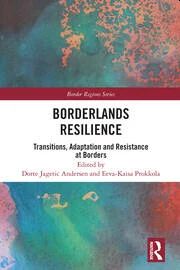chapter 5|17 pages
Resilience at Hungary’s borders
The chapter investigates how a transborder food community, cross-border commuting patterns, and solidarity activities taking place at Hungarian border sites can demonstrate different types of resilience as a process and over time. The cases highlight that resilience may be manifest as reactions to both multiple slow disruptions and sudden single disruptions. The study is therefore an answer to calls for contextualized approaches that also consider the crisscrossing of various scales and bounded entities, in contrast to more rigid, ‘placeless’ benchmarking measurements. The overall inquiry highlights how applying a process-based approach to resilience, also accounting for values and political resistance, help uncover developments in borderlands that may otherwise remain unearthed.



